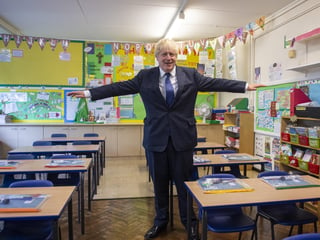Warning over invisible crisis for Yorkshire's vulnerable children as investigation details pressures over care support


Freedom of Information requests, submitted by The Yorkshire Post, looked in depth at the timeliness of provision over education and health care plans (EHCPs) for children and young people with special education needs and disabilities (SEND).
These care plans, drawn up to support a child or young person in education, must usually be assessed within 20 weeks, although from March authorities were given a measure of grace.
Advertisement
Hide AdAdvertisement
Hide AdWhile not an indicator of care or support, analysis does draw a picture of the pressure services were under as stay-at-home orders were issued and schools closed to all but the most vulnerable.


Two thirds of authorities which responded saw services stretched to the point where usual standards dipped, with half seeing their abilities to meet previous timescales fall by a third.
A third of authorities which responded are yet to return to previous levels. In some areas, against a guideline of five months for support, children have been waiting a year and a half.
Speaking to The Yorkshire Post, one family said their care plan had proved to be worth little more than the paper it was written on under lockdown.
Advertisement
Hide AdAdvertisement
Hide AdHaving battled for a support plan for their daughter, then aged four, she had been funded for a one-to-one support worker, with an EHCP in place.
Under 'reasonable endeavour', her parents claim, they were told this was no longer available, as the dedicated worker was needed to cover staffing shortages.
They challenged the decision, and won, but having filed a complaint their child has now been waiting nearly seven months.
"The most vulnerable in society, who are already disadvantaged, have been grossly and disproportionately affected," said the father, who has asked not to be named.
Advertisement
Hide AdAdvertisement
Hide Ad"We never went back. Our daughter has been without an EHCP since May, she has been without the benefit of support."
The onus, said the father, is always on the parents to fight for support they are entitled to, and additionally to have the funds to back that fight.
"It is failing, to a great extent," he said. "There is no comeback. There is no consequence.
"It diminishes the experience of the most vulnerable who are already at a severe disadvantage. Lockdown means most of the problems aren't seen."
'Lasting harm'
Advertisement
Hide AdAdvertisement
Hide AdEarlier this month, the Chief Inspector of Education and Children’s Social Care warned that pupils with special education needs and disabilities had been particularly affected by the pandemic.
Their access to additional support and healthcare was sharply reduced during the lockdown, Ofsted's annual report noted, and early identification and assessment suffered when they were not in school. For some children, it warned, this will cause lasting harm.
In Doncaster, FOI analysis revealed, one child has been waiting 462 days, over 15 months, to get a support plan in place to support them in accessing education.
In Barnsley, one child had been waiting 574 days, over 18 months, although the authorities' rates have dramatically improved over the course of the year.
Advertisement
Hide AdAdvertisement
Hide AdNot all authorities struggled, the data shows. In the East Riding, rates dramatically improved, with no child waiting longer than 20 weeks.
North Yorkshire excelled - ramping up services to meet gold standard guidelines at 100 per cent of the time since April. One child has waited nine months, the authority confirmed, but only because the schools were closed and assessments could not be carried out.
In Rotherham, where rates dipped by a third, there was a note alongside the official data. The results were "atypical", it stressed, because of the impact of the pandemic on schools.
Government response
A Department for Education spokesperson said: "We know this pandemic has proven especially challenging for many vulnerable families.
Advertisement
Hide AdAdvertisement
Hide Ad"That’s why we provided extra funding to help low-income families who have seriously ill or disabled children with costs or equipment, and the Children’s Minister has recently written to all families of children with additional needs to reassure them their education, health and wellbeing remains her top priority.
“We kept schools open to pupils with Education, Health and Care plans throughout the pandemic where it was safe to do so, and we are working closely with the sector to identify issues where they arise.
"Our £1bn Covid catch-up fund gives additional weighting to specialist settings in recognition of the higher costs they face and we are boosting high needs funding by £780m this year and a further £730m next year – bringing it to a total of £8bn in 2021-22. Our SEND review will further improve how young people with additional needs are supported.”
_________________________________________________________________________________
Advertisement
Hide AdAdvertisement
Hide AdSupport The Yorkshire Post and become a subscriber today. Your subscription will help us to continue to bring quality news to the people of Yorkshire. In return, you'll see fewer ads on site, get free access to our app and receive exclusive members-only offers. Click here to subscribe.
